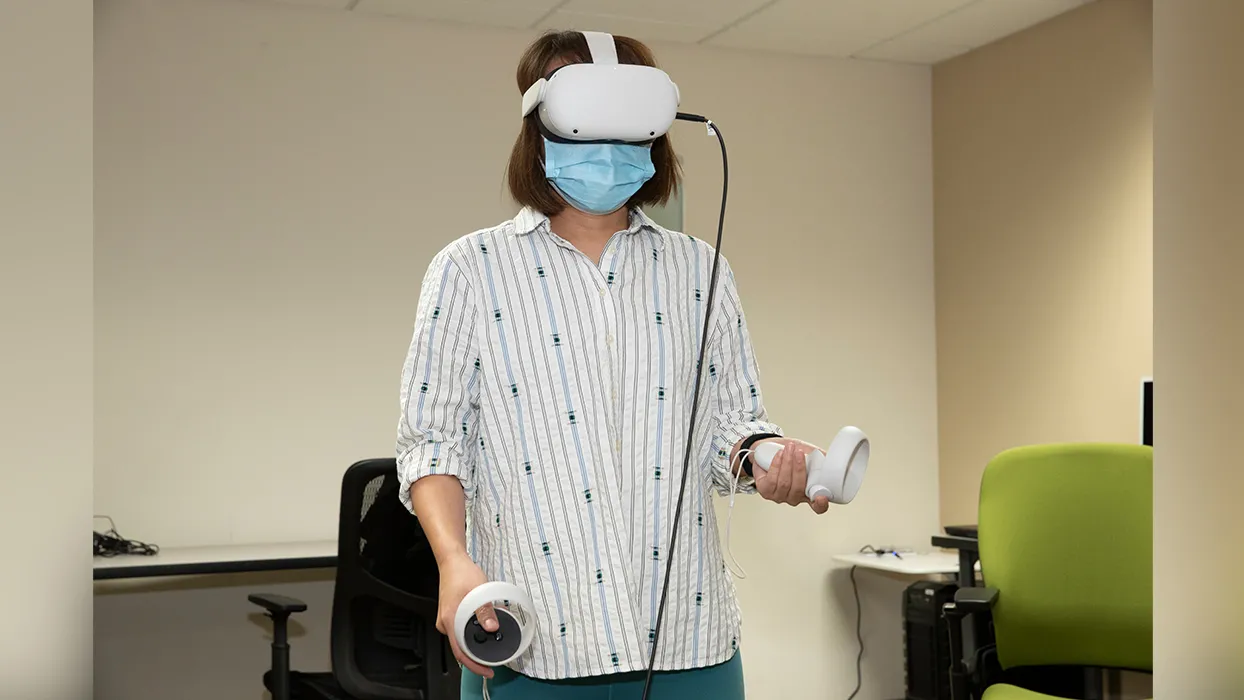Joe Gutierrez | Office of Strategic Communication | (909) 537-3007 | joeg@csusb.edu

Cal State San Bernardino professors Fadi Muheidat (computer sciences), Kristi Papailler (theatre arts) and Wagner Prado (kinesiology) and CSUSB instructional technologist Yutong Liu were accepted to present their work with the university’s Extended Reality for Learning (xREAL) Lab with Information Technology Services (ITS) at EDUCAUSE’s ELI 2022 Annual Meeting held June 8-10 in San Diego.
The EDUCAUSE Learning Initiative (ELI) Annual Meeting is a premier event where faculty, IT personnel and industry partners explore different technology-driven approaches to broad learning issues and share expertise across institutions.
Papailler and Liu were joined by CSUSB instructional technologist Bobby Laudeman and computer science student Logan Ashbaugh in delivering the presentation titled “VR Meets AI Meets the Matrix: Using Embodied Conversational Agents for Experiential Learning.”
The presentation explained how Cal State San Bernardino uses embodied conversational agents (ECA) to create experiential learning in virtual reality (VR) training simulations for kinesiology and theatre, while increasing students’ empathy and engagement. The presentation also showcased work done in the xREAL Lab at the intersection of VR, motion capture (MoCap), and artificial intelligence (AI).
One of these projects include The Inaugural Poets Project, in which theatre students use MoCap technology to create a virtual poetry performance and explore a groundbreaking MoCap curriculum. Another project is the Kinesiology VR Simulation Project, a VR-taught Exercise Physiologist Certification Preparatory Course that provides the knowledge and skills necessary to prepare individuals as Certified Exercise Physiologists (EP) recognized by the American College of Sports Medicine (ACSM) and the United States Registry of Exercise Professionals (USREPS).
For Laudeman, the ELI presentation was an opportunity to showcase the leading-edge VR work done in the xREAL Lab. “Presenting at the ELI Annual Meeting was very insightful into the value of our projects,” he said. “Many individuals seemed interested in the work that we are doing and giving us suggestions into areas that our applications might help, such as teaching students with autism better social skills. Showcasing the project also gave me motivation to push the development even further to prove how valuable it can be.”
Papailler thanks faculty director and xREAL co-founder, Mihaela Popescu, and assistant director of xREAL, James Trotter, in her statement regarding her experience at ELI. “It was wonderful to represent CSUSB and to present and discuss the vital and brilliant work of our xREAL Lab,” she said. “I also enjoyed connecting with scholars and potential collaborators from around the world who are engaged in groundbreaking STEAM projects. Thank you Mihaela and James for the outstanding leadership and support that made this presentation possible!”
Ashbaugh viewed the conference as a learning opportunity. “Overall, I enjoyed the experience of this conference, both presenting and attending,” he said. “I liked showing off what I am capable of in terms of programming, especially to other people with the same mindset. Although I feel I could have presented better, I feel that the important technological things in my presentation were presented well.”
Liu, who conducted a live demonstration of the kinesiology projects, echoes Ashbaugh’s and Laudeman’s appreciation for the feedback provided. “I feel excited to (have) complete(d) my first live demo at the U.S. nation-wide higher education conference. It was challenging to quickly set up a desktop with an unknown audio system for our Oculus quest without onsite rehearsal. We made it successfully.”
The presentation garnered interest from multiple attendees including Kathe Pelletier, director of EDUCAUSE Teaching and Learning Program, who stated, “The team at California State University, San Bernadino inspired the EDUCAUSE Learning Initiative community through their innovative use of embodied conversational agents for experiential learning. Their project navigates the balance between digital and physical learning spaces while showing great potential to improve accessibility and learning outcomes.”
About xREAL
Extended Reality for Learning (xREAL) Lab with Information Technology Services (ITS) at California State University, San Bernardino (CSUSB) is an interdisciplinary technology innovation hub that brings together faculty, students, and staff to imagine and design immersive learning experiences with 3D modeling and printing, augmented reality, mixed reality, virtual reality, motion caption, and machine learning technologies. Each year, xREAL works with faculty fellows and undergraduate and graduate students across disciplines to provide a vision for future teaching and learning, mentorship and hands-on experience for the students, and sustainable innovation for the larger campus community. xREAL work is made possible thanks to generous support from CSUSB President Tomás D. Morales and VP for IT Samuel Sudhakar.